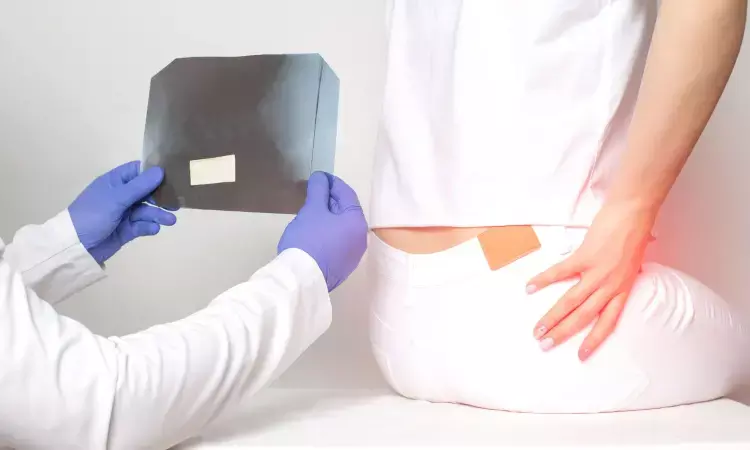- Home
- Medical news & Guidelines
- Anesthesiology
- Cardiology and CTVS
- Critical Care
- Dentistry
- Dermatology
- Diabetes and Endocrinology
- ENT
- Gastroenterology
- Medicine
- Nephrology
- Neurology
- Obstretics-Gynaecology
- Oncology
- Ophthalmology
- Orthopaedics
- Pediatrics-Neonatology
- Psychiatry
- Pulmonology
- Radiology
- Surgery
- Urology
- Laboratory Medicine
- Diet
- Nursing
- Paramedical
- Physiotherapy
- Health news
- Fact Check
- Bone Health Fact Check
- Brain Health Fact Check
- Cancer Related Fact Check
- Child Care Fact Check
- Dental and oral health fact check
- Diabetes and metabolic health fact check
- Diet and Nutrition Fact Check
- Eye and ENT Care Fact Check
- Fitness fact check
- Gut health fact check
- Heart health fact check
- Kidney health fact check
- Medical education fact check
- Men's health fact check
- Respiratory fact check
- Skin and hair care fact check
- Vaccine and Immunization fact check
- Women's health fact check
- AYUSH
- State News
- Andaman and Nicobar Islands
- Andhra Pradesh
- Arunachal Pradesh
- Assam
- Bihar
- Chandigarh
- Chattisgarh
- Dadra and Nagar Haveli
- Daman and Diu
- Delhi
- Goa
- Gujarat
- Haryana
- Himachal Pradesh
- Jammu & Kashmir
- Jharkhand
- Karnataka
- Kerala
- Ladakh
- Lakshadweep
- Madhya Pradesh
- Maharashtra
- Manipur
- Meghalaya
- Mizoram
- Nagaland
- Odisha
- Puducherry
- Punjab
- Rajasthan
- Sikkim
- Tamil Nadu
- Telangana
- Tripura
- Uttar Pradesh
- Uttrakhand
- West Bengal
- Medical Education
- Industry
Tranexamic acid may decrease red blood cell transfusion need in hip fracture surgery

A review published in the Cochrane Database of Systematic Reviews entitled "Interventions for reducing red blood cell transfusion in adults undergoing hip fracture surgery: an overview of systematic reviews" By Dr Sharon R and colleagues has concluded that
Hip fracture is common in older adults due to osteoporosis. There is acute blood loss both due to injury and surgery. Older patients also have a greater risk of anaemia and may require blood transfusion also in their treatment. Allogenic blood transfusions (ABT) may be given before, during, and after surgery to correct chronic anaemia or acute blood loss. Still, there is uncertainty regarding the benefit‐risk ratio for ABT. The risks involved are infections, a longer stay in the hospital, etc.
In the present study, researchers aimed to find therapeutic modalities to reduce the need for a blood transfusion and pharmacological and non‐pharmacological interventions to minimise additional blood loss. They also wanted to find out the association of treatment with quality of life, side effects, etc.
The systemic review was researched for treatments to reduce blood loss in hip fracture patients.
The summary of this review is given below:
- There were 17 reviews about tranexamic acid and nine reviews about iron.
- A total of 36 studies and 3923 participants were included.
- Patients were given tranexamic acid before, during, or after surgery, either intravenously or topically.
- For iron, treatment was given intravenously.
For tranexamic acid:
- The tranexamic acid reduces the need for a blood transfusion. For every 1000 hip fracture patients, 257 do not require a blood transfusion.
- The tranexamic acid probably reduces the volume of transfused PRC.
- There were no reported postoperative delirium, ADL, or quality-of-life outcomes.
For iron:
- There were nine reviews, seven eligible RCTs
- There may be little or no difference according to whether intravenous iron was given in: the number of people who required ABT, the volume of transfused blood, infection or mortality within 30 days.
- Researchers did not report little or no difference in delirium.
- No reviews reported outcomes of cognitive dysfunction, ADL, or HRQoL.
They said that using tranexamic acid before, during, or after hip fracture surgery reduces the need for a blood transfusion.
Treatment with iron may make little to no difference to whether people need a blood transfusion following hip fracture surgery.
Further reading:
https://www.cochranelibrary.com/cdsr/doi/10.1002/14651858.CD013737.pub2/full
BDS, MDS in Periodontics and Implantology
Dr. Aditi Yadav is a BDS, MDS in Periodontics and Implantology. She has a clinical experience of 5 years as a laser dental surgeon. She also has a Diploma in clinical research and pharmacovigilance and is a Certified data scientist. She is currently working as a content developer in e-health services. Dr. Yadav has a keen interest in Medical Journalism and is actively involved in Medical Research writing.
Dr Kamal Kant Kohli-MBBS, DTCD- a chest specialist with more than 30 years of practice and a flair for writing clinical articles, Dr Kamal Kant Kohli joined Medical Dialogues as a Chief Editor of Medical News. Besides writing articles, as an editor, he proofreads and verifies all the medical content published on Medical Dialogues including those coming from journals, studies,medical conferences,guidelines etc. Email: drkohli@medicaldialogues.in. Contact no. 011-43720751


